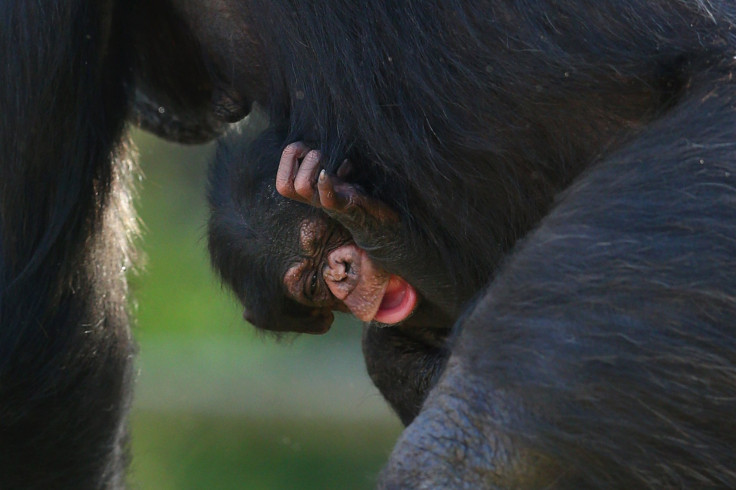Chimpanzee And Human Similarities: Mother Performs Funeral Rites, Cleans Adopted Son After Death

For the first time ever, scientists may have observed chimpanzees performing funeral rites, according to a study published Monday in the journal Scientific Reports. A 33-year-old chimpanzee named Noel was seen cleaning the body of her adopted son, Thomas, after he died at the Chimfunshi Wildlife Orphanage Trust in Zambia.
Noel used a piece of grass to clean Thomas’ teeth after his death, which was likely the result of a viral and bacterial lung infection. Noel was looking after the 9-year-old male chimpanzee since his mother died four years before.
Read: Cincinnati Zoo's Premature Baby Hippo Finally Off Oxygen, Healthy
“To date, this behavior has never been reported in chimpanzees or any other non-animal human species,” said Dr. Edwin van Leeuwen, a research fellow at the University of St. Andrews and the lead author of the study. “Chimpanzees may form long-lasting social bonds and, like humans, may handle corpses in a socially meaningful way.”
A chimpanzee has been filmed cleaning the teeth of her dead son with a stick https://t.co/wRBsJIqKeA pic.twitter.com/OtAbbXvfrC
— New Scientist (@newscientist) March 16, 2017
Researchers noted that Noel could have been attempting to determine how Thomas died, as she was seen tasting the debris she removed from his teeth.
Other scientists urged caution when reading into the behavior.
“We simply do not know if and how much chimps understand about death,” Thibaud Gruber of the University of Geneva told New Scientist Thursday. “In other words, it is unclear whether this is ‘corpse cleaning’ or simply ‘social cleaning.’ But certainly, it adds on behavioral descriptions of unusual behavior displayed by chimps when they face the death of one of their species.”
Chimpanzees exhibited unique behavior in the past. Maternal care is necessary for young chimpanzees’ survival and researchers noted close relationships between mothers and children throughout studies of the species.
Read: Whales Killed In Norway Are 90 Percent Female, 'Almost All' Pregnant
“Chimpanzee infants and juveniles benefit from the close relationship with their mothers in terms of food, warmth, protection and the opportunity to learn skills,” reported the National Primate Research Center at the University of Wisconsin, Madison.
A study published in 2014 by researchers at Georgia Statue University also showed that chimpanzees exhibited many personality traits similar to humans, including agreeableness and extroversion, linking the neurobiology of the two.
© Copyright IBTimes 2024. All rights reserved.






















